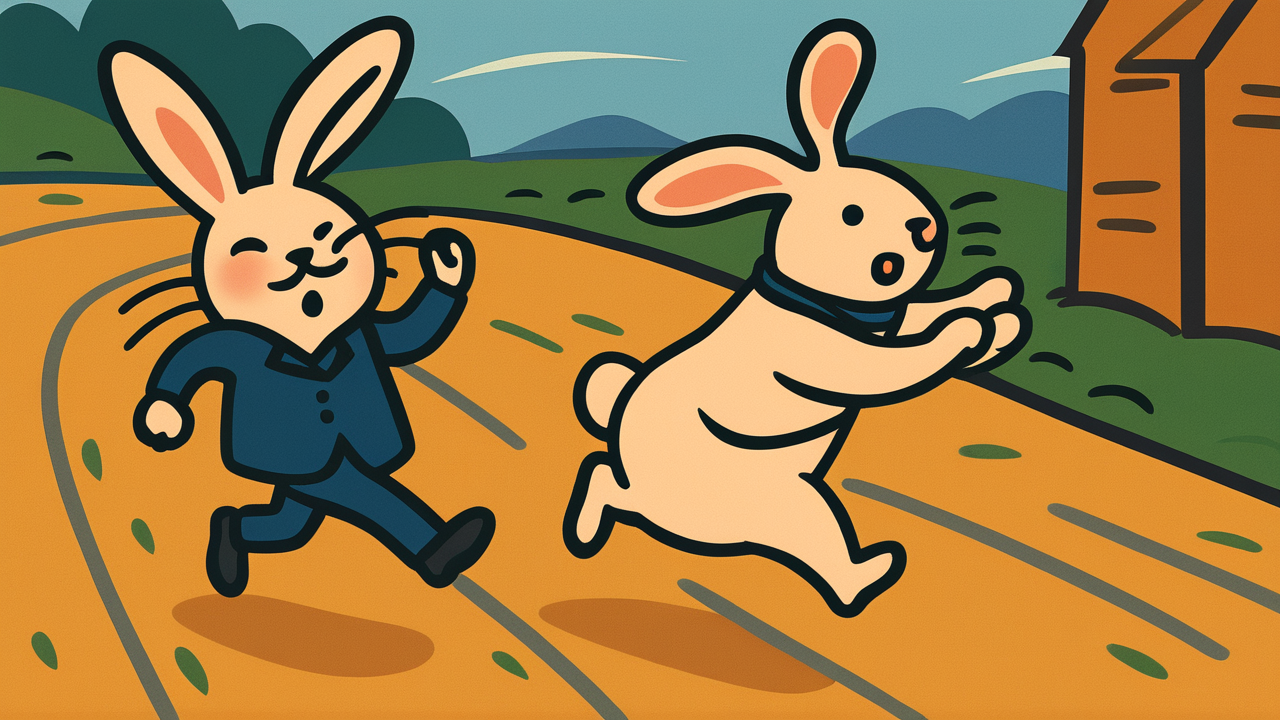How to Read “二兎を追う者は一兎をも得ず”
Nito wo ou mono wa itto wo mo ezu
Meaning of “二兎を追う者は一兎をも得ず”
This proverb means that when you pursue two goals simultaneously, you end up achieving neither.
It represents a warning that if you don’t focus on one thing and greedily try to do this and that, everything will end up half-finished. It illustrates a situation where a hunter could reliably catch rabbits by targeting them one at a time, but by aiming for two simultaneously, their attention becomes scattered and both escape.
This proverb is used when someone is hesitating while trying to pursue multiple goals or plans simultaneously, or in situations where they should be concentrating but are distracted by other things. It can also be used as a personal reminder.
In modern times, this lesson applies to situations such as targeting multiple industries simultaneously during job hunting, trying to obtain multiple qualifications at once while studying, or attempting to develop multiple businesses simultaneously in business. It’s truly practical wisdom that teaches us the importance of focused concentration.
Origin and Etymology
“Person who chases two rabbits does not catch even one rabbit” is said to originate from ancient European fables. This lesson was born from a story about a hunter who tried to chase two rabbits simultaneously and ended up catching neither.
It is believed to have been transmitted to Japan via China, and this expression can already be found in Edo period literature. In China, there is a similar phrase meaning “一心不能二用” (one heart cannot be used for two purposes), and when this entered Japan, it likely became established as the more concrete and understandable rabbit metaphor.
What’s interesting is that this lesson exists in similar forms around the world. In the West, it’s known as “He who chases two hares catches neither,” and Korea also has a proverb with the same meaning: “두 마리 토끼를 쫓는 자는 한 마리도 잡지 못한다.”
This shows that fundamental human characteristics—namely, the limits of concentration and greedy psychology—are common across cultures. Edo period merchants and modern businesspeople alike have needed this lesson in similar situations.
Usage Examples
- In job hunting, I’m targeting both sales and administrative work, but I’m worried it might become a case of “Person who chases two rabbits does not catch even one rabbit”
- I was thinking of taking both bookkeeping and English proficiency tests while studying for qualifications, but remembering the phrase “Person who chases two rabbits does not catch even one rabbit,” I decided to focus on just one
Modern Interpretation
In modern society, the interpretation of this proverb has become complex. This is because in our information society, “multitasking” is considered an important skill, and running multiple projects simultaneously has become commonplace.
Particularly in the IT industry and startup companies, developing multiple businesses with limited resources is required. Also, in personal career development, concepts like “side jobs” and “parallel careers” are gaining attention, and it’s said to be an era where you can’t survive with just one specialty.
However, this doesn’t mean the proverb has become outdated. Rather, precisely because we live in an era with infinitely expanding choices, the value of this lesson has increased. In a world where new information constantly flows through social media and various temptations exist, the ability to concentrate on what’s truly important is being tested.
As a modern interpretation, it’s often understood not as “don’t do multiple things simultaneously,” but as “prioritize and concentrate on what’s most important at this very moment.” Even in time management techniques, the effectiveness of “single-tasking”—concentrating on one task—has been scientifically proven, making this an interesting example of ancient wisdom being validated by modern science.
When AI Hears This
Our brains actually cannot “multitask.” What’s happening is a phenomenon that neuroscientists call “task switching.” In other words, even when we think we’re handling multiple tasks simultaneously, our brains are simply switching between tasks at high speed.
This switching comes with a significant cost. Research from Stanford University reveals that every time we switch tasks, a “cognitive cost” occurs, and it takes an average of 23 minutes to regain full concentration. When you’re checking emails while creating documents, your brain is actually busy jumping back and forth between “email → document → email → document,” with efficiency dropping each time.
Even more surprising, MIT research has proven that people who frequently multitask experience decreased attention span and memory capacity. The brain circuit called the “default mode network,” which activates during focused concentration, becomes disrupted, making deep thinking impossible.
While our modern digital environment constantly puts us in multitasking mode, neuroscience clearly shows us otherwise. “Single-tasking” – focusing on one thing at a time – is the most efficient method for producing high-quality results. Ancient wisdom has been beautifully validated by cutting-edge science.
Lessons for Today
What this proverb teaches us today is the importance of “selection and concentration.” Precisely because we live in an era overflowing with information and infinite choices, we need the ability to discern what’s truly important.
If you’re currently hesitating about something, stop and think for a moment. Among those multiple options, which one do you truly desire from your heart? I understand the feeling of wanting to have everything, but life has the limitation of time.
What’s important is not being afraid to give things up. Choosing one thing also means giving up others, but that’s not defeat at all. Rather, it’s the courage to clarify your values and put all your effort into what’s truly important.
The sense of achievement and fulfillment you get from focused concentration is something special that you can’t experience when doing multiple things half-heartedly. Please use your limited lifetime on what’s most valuable. You’ll surely gain results and satisfaction beyond your imagination.



Comments